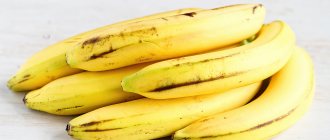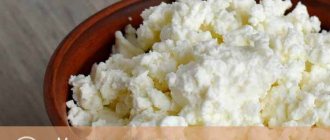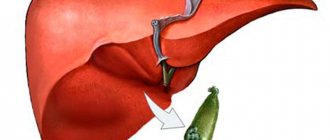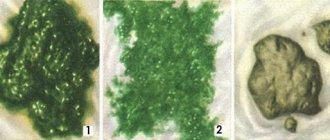Digestive disorders almost always require a diet. Various foods can cause vomiting, diarrhea and increased gas formation.
Dietary nutrition is especially important for diarrhea, since diet directly affects this condition. Many patients are interested in what they can eat if they have diarrhea. Nutritionists recommend a limited number of meals.
What is diarrhea?
If you have diarrhea, you need to drink a lot
Diarrhea is a symptom of gastrointestinal disorders characterized by the formation of liquid stool.
Normally, the stool should be hard, but if there is excessive fluid retention in the large intestine, so-called diarrhea may occur.
Diarrhea in itself only indicates a pathological condition of the large intestine, but is not a disease.
Normally, up to 75% of the contents of stool consists of water. The remaining 25% consists of the following substances:
- Undigested carbohydrates.
- Insoluble dietary fiber.
- Protein decomposition products.
- Fats.
- Slime.
- Intestinal discharge.
A person can absorb a significant amount of water with food, but the function of the large intestine is to absorb excess fluid. The absorption process may be disrupted due to various pathological phenomena, most often associated with cell damage.
In some cases, the intestines simply cannot cope with absorption due to the large volume of fluid received.
Laxatives or herbs?
What method of dealing with constipation is considered the most effective if there is no independent urge to defecate?
Laxatives are effective at first, when the issue is acute and needs to be resolved as quickly as possible. However, with prolonged use, they cause addiction to the body and lead to “lazy bowel” syndrome, which is characterized by a weakening of its motor activity.
Synthetic substances that have a laxative effect include: phenolphthalein, isafenin, bisacodyl.
Side effects from taking laxatives (with long-term abuse):
- intestinal obstruction;
- allergic reactions (rash, itching);
- vomit;
- cancer of the gastrointestinal tract;
- drug diarrhea;
- metabolic disorders;
- dysfunction of the small intestine, colitis.
Preparations made from cellulose derivatives (fiber), semi-synthetic and natural carbohydrates are considered relatively harmless. A prerequisite for their observance is the intake of a sufficient amount of fluid into the body (2 - 3 liters per day).
Medicinal herbs are the most harmless way to normalize stool. However, the biologically active substances included in the collection have a laxative effect due to the cumulative effect. To achieve a lasting result, it will take from 5 to 20 days of regular drinking of the drug.
Medicinal plants for constipation:
- Tangut rhubarb root;
- alder buckthorn bark;
- stalks of knotweed;
- kelp sugar;
- senna holly leaf;
- roots of field steelweed;
- dill herb;
- joster fruit;
- rhizome of licorice and horse sorrel;
- stems of centaury umbelliferum;
- Agave leaves.
Constipation is often accompanied by bloating, so to minimize discomfort, taking carminative herbs is recommended: dill, chamomile flower baskets, zori officinalis root, caraway seeds.
An effective folk remedy for irregular bowel movements is a combination of dried fruits (100 grams each of raisins, dried apricots, figs, prunes), 100 grams of honey, 5 grams of dry senna leaf. Use 10–15 grams of the composition daily during the day or at night.
Causes of loose stools
Maintaining good hygiene to prevent diarrhea
Diarrhea as a symptom can be associated with many pathological and physiological conditions. Let us list the main reasons for the phenomenon.
- Bacterial or viral infection. Salmonella, E. coli and other types of bacteria specifically affect the cells of the large intestine, which leads to disruption of its functions. Rotavirus, norovirus and other viruses, when they enter the gastrointestinal tract, cause viral gastroenteritis, the symptom of which is diarrhea. Diarrhea due to infectious diseases can be intense and painful. Often the patient loses too much fluid and electrolytes, causing dehydration. To prevent the development of dehydration, it is recommended to drink more fluids.
- Parasitic diseases. Some intestinal parasites can cause severe diarrhea, especially in people with weakened immune systems. As with viral and bacterial diseases, parasites disrupt the activity of intestinal cells. You can become infected with parasites by drinking dirty water and food. The main route of transmission is fecal-oral.
- Non-infectious intestinal diseases. Diarrhea can be a symptom of many inflammatory diseases, including Crohn's disease, ulcerative colitis and celiac disease. The mechanism of formation of loose stool remains unchanged: the inflammatory process affects the cells of the colon and blocks the function of water absorption.
- Taking medications. Many drugs can provoke the formation of loose stools. These include some antibiotics, drugs for treating heartburn and reflux disease, chemotherapy and various laxatives.
- Allergies and food intolerances. In patients suffering from food allergies or intolerances, diarrhea occurs during exacerbations. With intolerance, the intestines are not able to absorb a certain substance, which causes cellular irritation. Allergies affect colon cells in a way similar to inflammation.
- Nutritional features. Some food components themselves cause fluid retention in the intestines.
To more accurately determine the cause of diarrhea, you should consult a doctor. Loose stools can be a sign of dangerous infections.
Nutrition rules
After poisoning, you need to eat up to 7 times a day in the first days, in very small portions. Subsequently, the frequency of meals is reduced to 3-4, and the daily and portion volume is gradually increased. The temperature of the food is room temperature or warm; cold or hot food is not allowed, as irritation or damage to the mucous membrane, which is still very vulnerable during this period, is possible.
In no case should you overeat; it is important to observe the subjective state, a feeling of heaviness, fullness, possible nausea or the urge to vomit, and stool disturbances. If such signs appear, be sure to inform your doctor.
After the fifth day, if you feel well, a gradual return to your usual diet is possible.
If the intestinal microbial flora is disturbed, doctors recommend taking probiotics or prebiotics, for example Laktofiltrum, to normalize it.
Other symptoms
Diarrhea is not always easy to eliminate without pills
Along with diarrhea, the patient may experience other pathological signs of gastrointestinal diseases. The following symptoms may appear:
- Bloating.
- Intestinal colic.
- Increased intestinal motility.
- Nausea and vomiting.
- Fever.
- Weakness and dizziness.
- The appearance of blood in the stool.
- Weight loss.
- Abdominal pain.
The most serious symptoms are usually associated with viral and bacterial intestinal infections.
What can you eat if you have diarrhea?
Proper diet planning will help normalize digestion and get rid of the symptoms of gastrointestinal disorders. Diarrhea requires the addition of special foods to the diet.
Particularly important is the content of fiber and other dietary fibers that help form hard stools. List of recommended products:
- Bananas. These fruits will help relieve diarrhea and other unpleasant symptoms of intestinal disorders. The fiber contained in banana pulp helps form stool. In addition, eating bananas increases the amount of time between trips to the toilet, which is especially important for diarrhea.
- Rice. This product is easy to digest and helps form hard stools. It is recommended to eat white rice, as the fiber in brown and wild rice can make diarrhea worse.
- Apples. The pectin contained in these fruits improves the absorption of water in the intestines. In addition, apples contain a lot of glucose, which is necessary to restore the body's energy after a severe disorder.
- Yogurt. If diarrhea is a complication of taking antibiotics, yogurt can help restore the balance of gut bacteria.
- Weak tea. The tannins in green and black tea will help relieve symptoms of diarrhea.
- Buckwheat, millet and semolina porridge. These products increase the time it takes for stool to form.
- Marshmallow without additives. Regular marshmallows contain a lot of pectin.
- You can also add baked fruits and vegetables to your diet.
Gentle mode
With diarrhea, it is necessary to provide the patient’s body with energy, but this must be done carefully. Preference should be given to easily digestible foods: boiled, steamed and then pureed. Steamed cutlets, quenelles, soufflés made from tender lean meat or fish are the best source of protein. Slimy cereal soups with low-fat light broth are recommended. Porridges made from rice, oatmeal, or buckwheat must be wiped before use.
Allowed are soft-boiled eggs or in the form of a steamed omelet, fresh unleavened cottage cheese, pureed baked apples, jelly made from fruits and berries that have a fixing effect (pear, blueberry, dogwood, quince). The only fat allowed is butter – it can be added little by little to prepared dishes.
For diarrhea, it is useful to eat yesterday's wheat bread and wheat crackers - they have adsorbent properties. Other baked goods are excluded.
Undesirable foods for diarrhea
It is recommended not to eat fresh fruit if you have diarrhea.
The main goal of the antidiarrheal diet is to unload the intestines. The colon is especially vulnerable to inflammatory and infectious diseases, so it is necessary to avoid eating too heavy foods.
Certain foods can make diarrhea significantly worse. These include:
- Milk and dairy products (even with lactose substitutes).
- Fried, fatty and salty foods.
- Spices and hot sauces.
- Semi-finished products, especially with the addition of flavor enhancers.
- Pork and veal.
- Raw vegetables.
- Most confectionery products.
- Onion and garlic.
- Corn.
- Citrus fruit.
- Pineapples, cherries, wild berries, figs, currants and grapes.
- Alcoholic and coffee drinks.
- Carbonated drinks.
- Products with artificial sweeteners (especially sorbitol).
Many of the listed products, such as alcohol, carbonated drinks and coffee, can be even completely eliminated from the diet if you have intestinal disorders.
Duration of diarrhea
In most cases, diarrhea does not last long. Diarrhea may continue for several hours after consuming the offending product. With allergies and food intolerances, diarrhea also does not torment the patient for too long.










